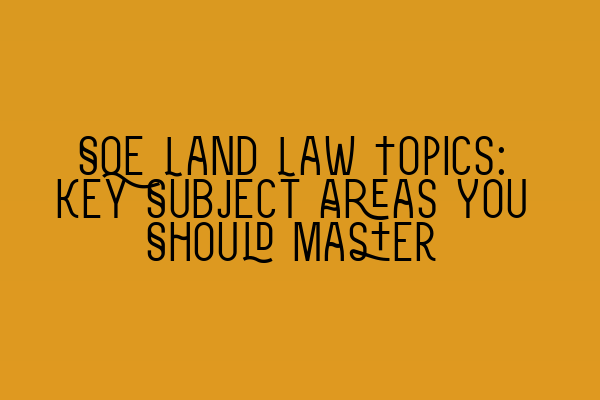SQE Land Law Topics: Key Subject Areas You Should Master
As a solicitor specializing in property law, it is crucial to have a deep understanding of land law. The Solicitors Qualifying Exam (SQE) includes land law as a fundamental subject, with specific topics that you need to master to succeed.
1. Freehold and Leasehold
One of the key concepts in land law is the distinction between freehold and leasehold ownership. Freehold ownership grants you absolute ownership of the land, while leasehold ownership involves leasing the land for a specific period of time. Understanding the differences between these two forms of ownership is vital.
To test your knowledge of freehold and leasehold, you can practice with SQE 1 exam questions on this topic.
2. Easements and Covenants
Easements and covenants are important legal rights and restrictions that affect land. An easement grants someone a right to use another person’s land for a specific purpose. On the other hand, covenants are agreements or promises made between parties regarding the use of the land. Understanding how easements and covenants work is crucial for advising clients and navigating property transactions.
If you want to assess your understanding of easements and covenants, try out the SQE 1 practice mocks FLK1 and FLK2.
3. Mortgages and Charges
Mortgages and charges are financial instruments used to secure loans against property. These topics involve understanding the rights and responsibilities of lenders and borrowers, as well as the different types of mortgages and charges that can exist. Being proficient in this area of land law is vital when dealing with property transactions and mortgage-related issues.
4. Co-ownership and Trusts
Co-ownership and trusts are essential aspects of land law that involve the simultaneous ownership of property by multiple parties. Whether it’s joint tenancy or tenancy in common, understanding the legal implications, rights, and obligations of co-ownership is vital. Additionally, knowledge of trusts is necessary for advising clients on estate planning and administering trust property.
To enhance your preparation in this area, consider enrolling in SQE 2 preparation courses that specifically cover co-ownership and trusts topics.
5. Adverse Possession
Adverse possession refers to the acquisition of ownership rights over land by occupying it for a certain period without permission from the legal owner. Understanding the requirements, defenses, and limitations of adverse possession is crucial when dealing with disputed land and property boundary issues.
For comprehensive preparation, ensure you are familiar with the relevant case law and legislation related to adverse possession. SQE 1 preparation courses can provide you with valuable resources for studying this topic.
Remember that the SQE exam dates are essential to keep track of. Make sure you know the upcoming exam dates set by the Solicitors Regulation Authority (SRA) so you can plan your studies and preparation accordingly.
Conclusion
Mastering land law is of utmost importance for solicitors specializing in property law. By developing a solid understanding of key subject areas, such as freehold and leasehold, easements and covenants, mortgages and charges, co-ownership and trusts, and adverse possession, you will be well-prepared for the SQE exams and equipped to provide expert advice to your clients.
If you’re looking for additional resources, consider taking advantage of the SQE 1 Practice Exam Questions and SQE 1 Practice Mocks FLK1 FLK2. Additionally, SQE 2 Preparation Courses can provide you with comprehensive materials to deepen your knowledge. Remember to stay updated on the SRA SQE Exam Dates to ensure you’re on track with your exam preparation.
